 To someone who composts with worms, worm tea and worm leachate might sound like the same thing. However, they are completely different. Worm leachate is the runoff from a worm bin. Worm tea is brewed from worm castings. Is worm leachate useful for fertilizing your plants? Can worm tea fertilize plants? Can you re-use worm leachate?
To someone who composts with worms, worm tea and worm leachate might sound like the same thing. However, they are completely different. Worm leachate is the runoff from a worm bin. Worm tea is brewed from worm castings. Is worm leachate useful for fertilizing your plants? Can worm tea fertilize plants? Can you re-use worm leachate?
Where Worm Leachate Comes From
Most plastic worm bins have a catchment tray under them. Excess moisture seeps to the bottom of the bin. Your worm bin might also have a spigot, making it easy to drain excess leachate. Every time you feed the worms, you add moisture to the worm bin. Kitchen scraps are mostly water. When the worms and microorganisms in the bin break down the scraps, they release water and carbon dioxide. Water vapor condenses inside the plastic container. As the excess water trickles through the bedding, it brings some nutrients with it.
The resulting dark water is tempting. It looks like a great source of fertilizer for your plants. Unfortunately, this leachate often contains a bad mixture of microorganisms. Left in the dark without the worms and bedding, the bad organisms reproduce. Leachate might also contain too much salt for your houseplants. Thus, worm bin leachate is a poor fertilizer.
If you see leachate accumulating in the bottom of your worm bin, you need to drain it. Drain it as needed. Or, if the bin has a spigot, leave it open and place a container underneath. Empty the container regularly.
Leachate can be a sign that your worm bin is too wet. The worm bin bedding should have the consistency of a wrung-out sponge. Test this. If it is too wet, the worm bin may start to smell bad, and the worms could get sick. See our article about wet worm bins.
It may be possible to re-use the leachate by diluting it with 10 parts water to 1 part leachate. You could use the bubbler for 24 hours (see below). However, your best bet is to discard the leachate. Pour it down the sink or toilet, or dump it on the driveway. If you decide to re-use leachate, apply it only to decorative plants.
If you’re looking for an easy-to-apply liquid fertilizer for your plants, make worm tea instead. Worm tea requires little effort to make, and it’s very convenient to apply.
Making Worm Tea
Worm castings, or worm poop, is filled with valuable microorganisms, especially when it is fresh. You will need about 10 gallons of water. If your water contains chlorine, dechlorinate it by letting it sit for 24 hours.
Harvest about a pound of worm castings from your vermicomposting bin. Place the worm castings into a mesh bag, stocking, or long sock. Tie it at the top. Put the bag of castings in a 5-gallon bucket, and add dechlorinated water until it is nearly full. Add 1 Tablespoon of molasses or other sugar. Then, place an aquarium bubbler in the bottom. Plug in the bubbler and let it run for 24 hours. This adds oxygen and encourages helpful bacteria to grow.
Remove the bubbler and bag. Mix the worm tea with another 5 gallons of dechlorinated water. This worm tea can be poured directly on the soil at the base of the plants. You can spray it on your garden or lawn. This nutrient boost will help your plants grow.
Uncle Jim’s Worm Farm is the #1 supplier of composting worms in the United States. We grow our own composting and fishing worms, and mealworms, on our farm in rural Pennsylvania. We also offer composters and accessories. Follow us on social media.


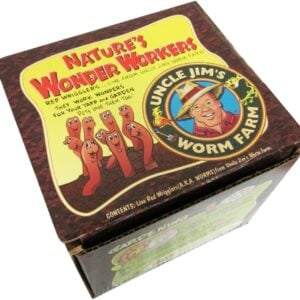
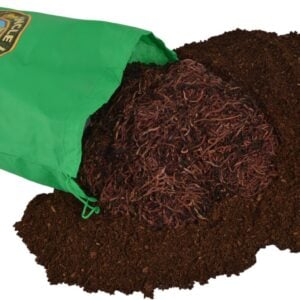
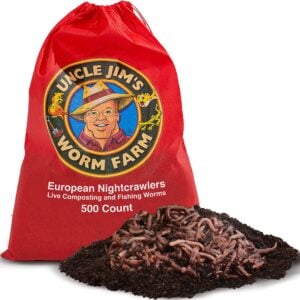
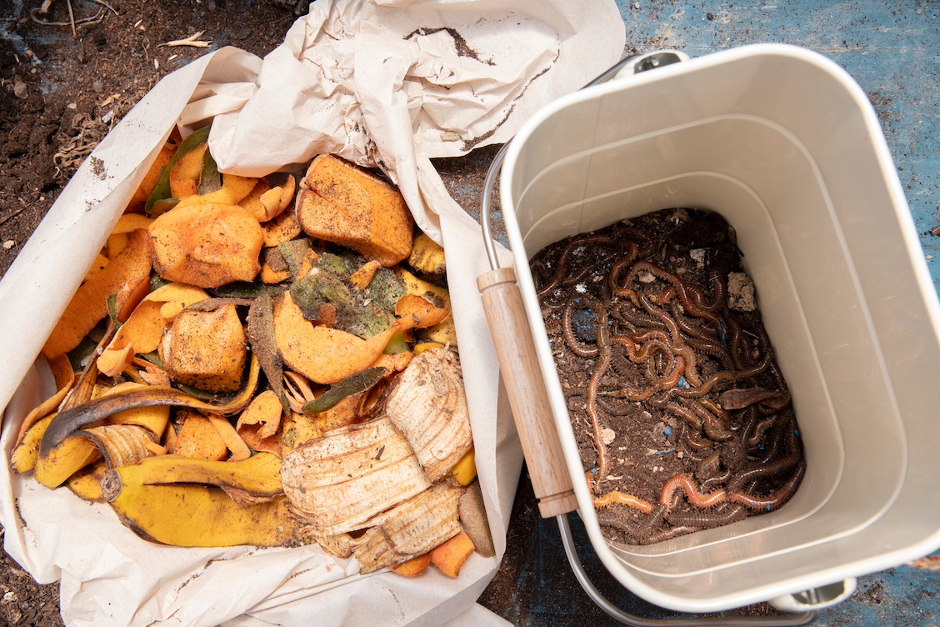
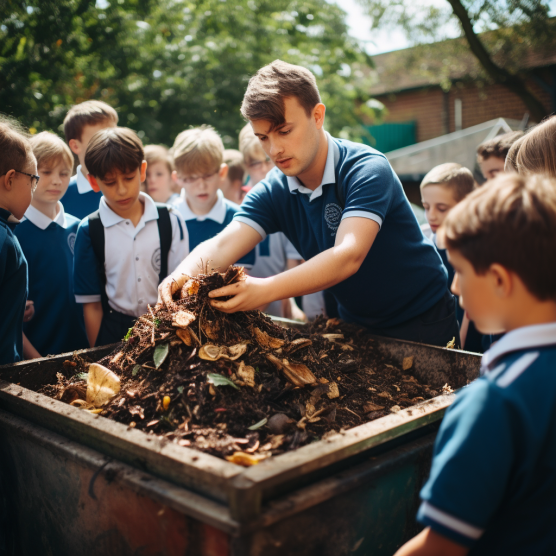

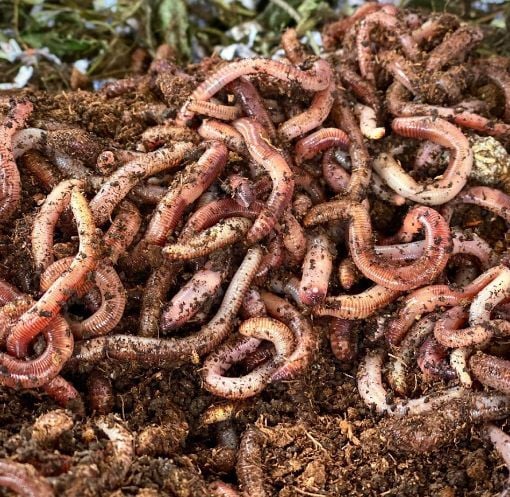
14 thoughts on “Can You Re-Use Worm Leachate? Is It Worm Tea?”
What is the purpose of the molasses in this process?
If I had to guess its to provide a sugar source for yeasts and bacteria to eat and thrive within the compost tea. These in turn feed microbes in the soil that work in tandem with the plants roots and facilitate the uptake of nutrients.
I have a worm tower in my raised bed. So is that a bad idea then, with leachate?
Is there any reason why I shouldn’t add leachate into winter-stored buckets of ventilated castings to maintain moisture?
You need sugar for fermentation – just like making beer.
I make new bedding (tray) for my worms and place it above the working tray. After a month (the worms move to the new tray above for food) I take the old tray with mostly worm poo castings and hose it with water to wash the castings into the collection tray below. I do this as quick as I can so not to dilute the worm poo too much. Any left over matter is returned to the new tray. I then collect/bottle the liquid. I do this about every 3-4 months when castings have built up. I blend my food scraps with water and pour on the top of my working tray each day or two. Can do 1 of 2 things – drain the blended scraps to get rid of most of the water before adding to the farm and run a fairly dry farm or just poor the blended material over the new farm and then spread the excess run off on the garden each week.
I have the potential to make a lot of worm tea. The growing season in PA is ending. What should I do with either the abundance os castings or worm tea?
George,
If you live in Pittsburgh area I will come and pick up any excess castings you have. Thanks!
I bought some red wriggler worms and have noticed that many of them crawl to where the last bin is and are in the area where the leachate is. I can’t find any answers on why they go there. I try to keep my bin balanced so it isn’t too wet or too dry. Am I doing something wrong that is causing them to do this? I have avoided adding very many foods that are high in acid so the PH Level of the bin is safe for them.
Hello and thank you for your question. Usually when worms go toward the bottom they are seeking moisture. Try the squeeze test on the bedding and if you cannot squeeze 2-3 drops of water out of the compost, you should add some water to the bedding. You can also put newspaper in the bottom of the bin to keep them from going down into the bottom but at this point you will need to dump the bin/tray and then add it and replace the contents. The worms will settle back in if you decide to do that.
Uncle Jim’s Worm Farm
Will red wrigglers survive when adding poop to the hole where my plant is going. When I add I always go thru the poop and remove any worms I find. I always feel bad that I may have overlooked some
Hello Pat;
Please clarify what you mean by poop? Worm Castings? if that is what you mean, yes, if there are worms in the castings and you are placing them in the garden with the castings, yes, they will survive and thrive in the garden bed.
Uncle Jim’s Worm Farm
I know mine gets wet when it rains alot. You can’t help that. I have been using the water to water my plants. I thought the rain water would filter through the already formed castings and accumulate at the bottom. I didn’t know it was bad. How can I use the castings if I can’t make worm tea. I don’t live somewhere where I can do that.